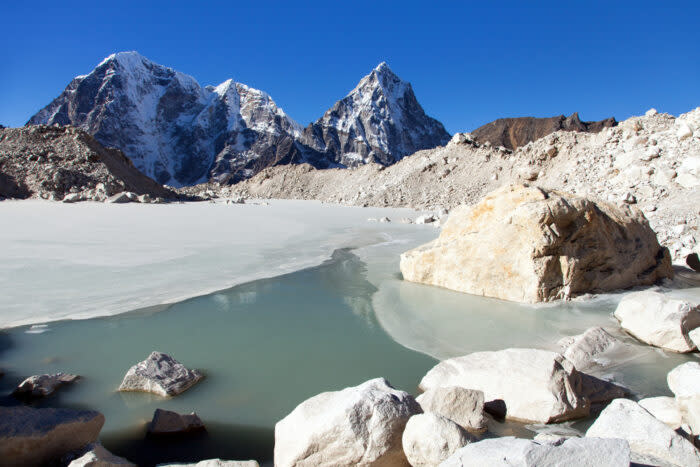Nepal Supreme Court Bans Helicopter Airlifts
A powerful new player has entered the debate about commercialization and the environment in Nepal. The country’s Supreme Court has ordered the government to limit the number of climbers on Everest. It also bans helicopters above base camp on all its mountains and orders new regulations to limit garbage on its peaks.
The tribunal’s order comes after a public interest petition filed by advocate Deepak Bikram Mishra, My Republica reported. The decision tasks the government with implementing the court order.
According to the justices, the government can only issue climbing permits after specifying how many climbers will be allowed, according to available capacity. Helicopter flights above base camp will also be banned, except for rescues.
Finally, climbing teams must submit a list of the gear and supplies they are carrying up the mountain and must leave a deposit. They receive back the deposit only after proving that they brought everything down.
Endless debate
Every season, local and national authorities try to minimize the impact of the growing high-altitude tourism industry on the fragile mountain environment. And every year, stories of overcrowding, abandoned garbage, and deaths on the world’s highest peaks taint Nepal’s reputation on the world stage.
On the other hand, the richest outfitters — some of which are partners in a helicopter business — make a case for airlifts and ever-larger teams. They argue that the helicopters increase safety, especially when they spare clients and staff from going through risky sections like the Khumbu Icefall. But mainly, helicopters allow faster and easier expeditions, which encourages clients to climb more than one peak in a season. More business. In recent years, helicopters have significantly increased profit by providing optional airlifts to or from higher camps.

The Supreme Court resolution highlights the potentially disastrous consequences of climate change, including melting glaciers melting and burst glacial lakes flooding downstream rural areas.
“In this context, it appears imperative for the state to undertake special care and protective measures in response to the impacts of climate change on the mountains and glaciers,” the order reads, as quoted in My Republica. “This also aligns with the constitutional responsibility of the state toward the environment and its citizens.”
The document blames over-tourism for negatively impacting conservation and sustainability. The court thus mandates pollution management and cleanup in mountain areas.
Measures already – but how effective?
Government officials may respond to the court order by arguing that such measures are already in place, especially on Everest and nearby mountains, through the Sagarmatha Pollution Control Committee. Every year also sees public and private cleaning campaigns, and Liaison Officers are theoretically in charge of controlling expeditions and raising visitors’ awareness. But the problem remains, how to increase the efficiency of such measures and find common ground among the different stakeholders.
Banning helicopters above base camp would clearly affect expedition logistics, especially on mountains such as Annapurna, where gear airdrops are common. Whether the Supreme Court ruling will have real teeth over powerful private interests remains to be seen.
The post Nepal Supreme Court Bans Helicopter Airlifts appeared first on Explorersweb.

